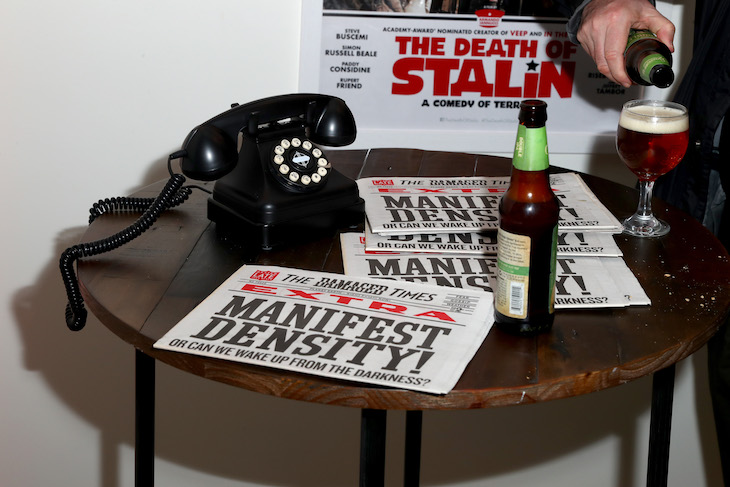Should I or shouldn’t I go and see The Death of Stalin, showing at the French village cinema last Sunday evening? To help me decide, I looked at what the compendious movie website Rotten Tomatoes had to say about it. The scores on the Tomatometer were disquieting. Ninety-six per cent of the 202 reviews by critics deemed it a hit, whereas only 78 per cent of 4,129 reviews posted by the general public agreed. Interesting. Normally, if a film is worth seeing, the film critics’ scores and the mob’s are roughly in alignment at 90 per cent or above. But when they differ by as much as this, one suspects that the film is pretentious or propaganda, or both.
I read a sample of the ‘top’ critics’ reviews. The Death of Stalin is both a comedy and a satire, they said. (An inevitable few thought it a satire of the current Trump administration.) Well, I like a good laugh as much as the next bloke, and I can live with a satire against Donald Trump. But is it actually funny? Will I laugh my head off? The majority of these top critics certainly thought so. ‘Raucously hilarious’, ‘An antic delight’, ‘The funniest film of the year so far’, ‘The funniest, smartest, most unforgiving comedy in years, and the best satiric film of the 2010s’. Wow. That last one tipped the balance. I scoffed my tea, polished my glasses and drove to the village cinema.
I’ve heard a rumour that the village mayor was pissed off last year because he thought the cinema was showing too many English language films, and had ordered the cinema committee to put on more French stuff. So I imagined that this recent comparative rarity of English language films would mean the place would be packed out with the monolingual British ex-pat community enjoying their moment in the cultural sun. But for the best satiric film of the 2010s they’d stayed away. Odd. I took my comfortable seat with five minutes to go. The pathetically sparse audience (about ten of us) was entirely French, judging by the idle chatter of the few punters dotted about. My row was empty until the last moment when a silent paraplegic in a neck brace was wheeled into position at the far end and left there.
Happily, there was no tedious prelude of deafening film trailers and inane advertisements. The only item inflicted on us was a tasteful and enjoyable ad for an international festival of world music to take place the following week in the next village. Then, without further ado, we were in Moscow at an orchestral concert and the beginning of what is said to be the funniest, smartest, most unforgiving comedy in years.
The sound engineer at an orchestral concert is about to take a personal call from Stalin. (He wants a recording sent immediately to his home. The concert is not being recorded. The sound engineer is panic-stricken.) With the best will in the world we searched desperately for something to laugh at. But the sound engineer’s slapstick panic seemed to be the only joke on offer for what felt like an eternity. The comedy, such as it was, was a very British, Ealing sort of comedy, except the word ‘fuck’ was said quite a lot, which was translated in subtitles as ‘Putain!’ After about five minutes of this, from the darkness behind me, someone offered a Francophone chuckle, which seemed to be saying, ‘Well, I’m not proud! Come on, everybody! We’ve got to make the best of this.’ But try as we might to find something to laugh at — if only someone’s trousers had fallen down we’d have been up and running — not one of us could find in themselves enough gaiety to let go.
On the contrary, I felt saddened after a while. Saddened that I’d been fooled by the top critics’ reviews; saddened at what must be a wide gulf between what makes the French and the British laugh; saddened at the frenetic efforts that the actors were putting in to so little comic effect; saddened for the poor Russians under Stalin; saddened for the village cinema committee’s failure of judgment.
And aside from that one, well-meant chuckle early on, we watched this raucously hilarious antic delight in baffled silence. During the entire 107 minutes, nobody laughed. Not once. Only the paraplegic expressed himself aloud. He was middle-aged. If I turned, I could see his braced head and expressionless face in the light of the screen. He was silent and immobile until about 20 minutes to go, when, suddenly overwhelmed by despair and frustration, he roared at the screen like an angry lion.







Comments